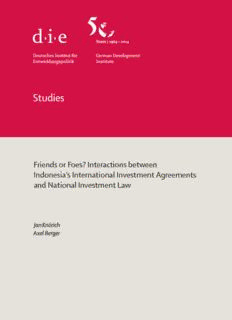Table Of ContentFriends or Foes? Interactions between
Indonesia’s International Investment Agreements
and National Investment Law
14-10112_US_Study 80.indd 3 14.02.14 12:53
Friends or foes? Interactions between
Indonesia’s international investment agreements
and national investment law
The German Development Institute / Deutsches Institut für Entwicklungspolitik
(DIE) is a multidisciplinary research, policy advice and training institute for
Germany’s bilateral and multilateral development cooperation. On the basis of
independent research, it acts as consultant to public institutions in Germany and
abroad on current issues of cooperation between developed and developing
countries. Through its nine-month training course, the German Development
Institute prepares German and European university graduates for careers in the field
of development policy.
Jan Knörich is Lecturer at King’s College London’s Global Institutes. His current
research examines foreign direct investment and its development implications,
international investment law and policy with a focus on developing countries, and
foreign investments by Chinese multinational enterprises. Dr Knörich is also an
expert on the Chinese economy. His work is cross-disciplinary, combining elements
of international business, global political economy, economic development and
Chinese studies.
E-mail: jan.knoerich@kcl.ac.uk
Axel Berger is a researcher at the German Development Institute / Deutsches Institut
für Entwicklungspolitik (DIE), Department for World Economy and Development
Finance, Bonn. He works on global investment policies, with a focus on emerging
and developing countries. His current major areas of research are the diffusion
patterns and development impacts of international investment agreements.
E-mail: Axel.Berger@die-gdi.de
Studies 82
Deutsches Institut für Entwicklungspolitik
Friends or foes? Interactions between
Indonesia’s international investment agreements
and national investment law
Jan Knörich
Axel Berger
Bonn 2014
Studies / Deutsches Institut für Entwicklungspolitik
ISSN 1860-0468
Die deutsche Nationalbibliothek verzeichnet diese Publikation in der
Deutschen Nationalbibliografie; detaillierte bibliografische Daten sind im
Internet über http://dnb.d-nb.de abrufbar.
The Deutsche Nationalbibliothek lists this publication in the Deutsche
Nationalbibliografie; detailed bibliographic data is available at http://
dnb.d-nb.de.
ISBN 978-3-88985-589-3
© Deutsches Institut für Entwicklungspolitik gGmbH
Tulpenfeld 6, 53113 Bonn
+49 (0)228 94927-0
+49 (0)228 94927-130
E-mail: die@die-gdi.de
http://www.die-gdi.de
Acknowledgements
This study is part of a research project on the developmental effects of
international investment agreements and would not have been possible
without the generous support of the German Federal Ministry for Economic
Cooperation and Development (BMZ). We would like to thank all those
who have contributed to this study. First and foremost, we would like to
thank all the experts who have offered their precious time to talk with us
about national and international investment policy-making in Indonesia.
Furthermore, we are grateful to Tilman Altenburg, Clara Brandi, Susan
D. Franck, Aimée Hampel-Milagrosa, Lauge N. Skovgaard Poulsen and
Peter Wolff, who all provided excellent comments on previous drafts of
this study. Last, but not least, we would like to thank Nathalie Venanzi and
Roberto Gonzales for excellent research assistance. All remaining errors
are our own.
Bonn and London, April 2014 Axel Berger and Jan Knörich
Contents
Abbreviations
Executive summary 1
1 Introduction 7
1.1 Case selection 13
1.2 Methodological approach 14
2 International investment agreements and national
investment law 17
2.1 The global diffusion of IIAs 18
2.2 IIA and host-country policy space 22
2.3 IIAs and national law 24
2.3.1 Definitions 28
2.3.2 Admission 29
2.3.3 Treatment of investors and investments 30
2.3.4 Non-discrimination 30
2.3.5 Protection of investments 33
2.3.6 Expropriation 33
2.3.7 Transfer of funds 34
2.3.8 Entry and sojourn of personnel 35
2.3.9 Dispute settlement 35
2.3.10 Investment facilitation and promotion 36
2.3.11 Investor obligations 37
2.3.12 Scope and exceptions 38
3 Indonesia’s investment policy 39
3.1 Indonesia’s economic context and foreign investment 41
3.2 Indonesian international investment policy 47
3.2.1 Indonesian IIAs 47
3.2.2 Investor-state dispute settlement in Indonesia 57
3.3 Indonesian national investment policy 60
3.3.1 Economic policy strategy and investment-related laws 62
3.3.2 Investment-specific laws and regulations 64
3.4 Indonesia’s international vis-à-vis domestic investment law 78
3.4.1 Definitions 78
3.4.2 Admission 81
3.4.3 Treatment of investors and investments 85
3.4.4 Non-discrimination 86
3.4.5 Protection of investments 90
3.4.6 Expropriation 92
3.4.7 Transfer of funds 94
3.4.8 Entry and sojourn of personnel 96
3.4.9 Dispute settlement 99
3.4.10 Investment facilitation and promotion 105
3.4.11 Investor obligations 109
3.4.12 Scope and exceptions 112
3.5 Recent Indonesian measures affecting investment 117
3.6 Policy coordination of international commitments with
national law 126
3.6.1 Inter-ministerial coordination 127
3.6.2 Stakeholder consultations 132
4 What can be learnt from the Indonesian experience? 135
4.1 A matter of complexity 135
4.2 Direction of interaction 137
4.3 Governance mechanisms matter 139
4.4 Enhancing policy space 142
5 Beyond the Indonesian case: general conclusions and
recommendations 145
Bibliography 151
Figures
Figure 1: Method for comparison of international commitments
with national laws 16
Figure 2: Annual and cumulative signed BITs and other IIAs,
1959–2012 19
Figure 3: Interactions of different IIA generations and various
bodies of national law 26
Figure 4: GDP growth in Indonesia, 2005–2014 (%) 41
Figure 5: Realised foreign and domestic direct investment in
Indonesia (US$ billion) 43
Figure 6: The bargaining triad 141
Tables
Table 1: FDI inflows into ASEAN countries in 2011, % of GDP 44
Table 2: FDI in Indonesia by home country in 2011 45
Table 3: IIAs ratified by Indonesia 47
Table 4: ICSID cases faced by Indonesia 58
Table 5: Indonesia’s domestic policy on investment in three stages 65
Table 6: Indonesia’s legal framework for investment 68
Table 7: ISDS provisions in Indonesian IIAs 102
Table 8: Exceptions and reservations in Indonesian IIAs 114
Table 9: Recent regulatory changes affecting investors in Indonesia 118
Table 10: Examples of discrepancies between IIAs and
national laws 143
Description:international commitments made in IIAs, or whether the reverse effect is the case, is crucial for economic policy-making in developing countries. 3 What governance mechanisms should be in place to ensure conformity of national and international investment laws? Foreign investment has a profound

